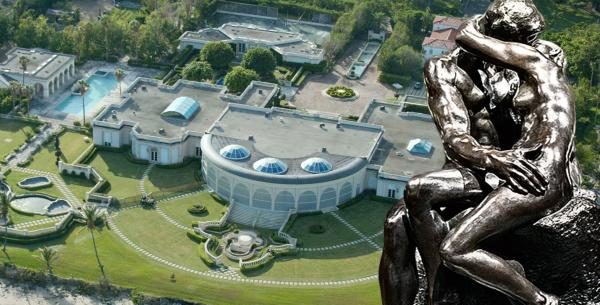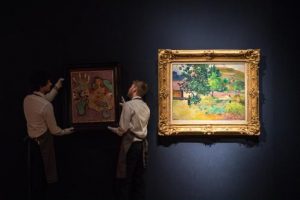
Oligarch hopes that art sale will lose him millions
The surrealist painting by René Magritte, according to the Christie’s expert, opens your eyes to a new way of seeing the world. An auction this week encompassing the artist’s masterpiece is certainly shining a light on the weird world of modern art. It is still a bit murky though.
A Picasso, a Rodin, a Gauguin and a Rothko are being sold along with the Magritte in London by a Russian oligarch who, it has been suggested by commentators, may be wanting to show they are worth less than he paid for them. Dmitry Rybolovlev, who made billions from fertiliser and spent much of it on art, marriage and Monaco football club, is shedding many of his works amid a bitter dispute with the man who helped him buy them.

Dimitry Rybolovlev and his daughter Ekaterina
Mr Rybolovlev has alleged in courts that his “art adviser” Yves Bouvier, who purchased at least 38 of the world’s most sought-after works for about $2 billion on behalf of the Russian, had misrepresented his acquisition costs. In short, Mr Rybolovlev says he had believed Mr Bouvier was taking a commission. Now he thinks his adviser was buying them before inserting mark-ups and selling them on to him.
So this week and next Mr Rybolovlev is putting under the Christie’s gavel in London artworks that were, in theory, worth hundreds of millions of pounds. Picasso’s Joueur de flute et femme nue, painted when the artist was closing in on 90 and in love with his final muse, was allegedly bought in 2010 for $35 million. Christie’s, however, estimates it will fetch between $8.2 million and $10.7 million.
Then there is Auguste Rodin’s bronze Le baiser, grand modèle bought by Mr Bouvier “on behalf of” Mr Rybolovlev allegedly for $10.4 million. Christie’s thinks it will fetch half that.

Gauguin’s Te Fare (La maison) is at the centre of a disagreement between a billionaire and his art deale
Or Magritte’s Le domaine d’Arnheim, a surrealist masterpiece that was allegedly purchased for $43.5 million. It may get an estimated $8 million in the London sale.
Mark Rothko’s No 1 (1949) was allegedly worth $36 million to Mr Rybolovlev. Whoever buys it could get it for $10 million. The biggest potential loss of the five lies with Gauguin’s Te Fare (La maison), bought for an alleged $85 million. The lower estimate at this week’s auction is $15 million.
“The gulf between Christie’s estimates and the original purchase prices of the works is a further illustration of the unprecedented scale and audacity of the fraud that the plaintiffs allege was perpetrated by Mr Bouvier,” Sergey Chernitsyn, a representative of the Rybolovlev Family Office, told Bloomberg.
There is, naturally enough in the international art market, a degree of opaqueness about the dispute between Mr Bouvier and Mr Rybolovlev. The Russian may have more paintings in the Christie’s sales, for example. Neither party is obliged to disclose this information. Sometimes even the auction houses are just dealing with agents and may not know who is selling.
As the original purchases between 2003 and 2013 were private deals, the prices for Mr Bouvier initially and Mr Rybolovlev latterly are not all in the public domain.
The precise arrangements between Mr Bouvier, whether as an art dealer or art adviser, and Mr Rybolovlev are central to their disputes. While Mr Rybolovlev says that Mr Bouvier was his agent who bought on his behalf and then over-inflated the price paid, Mr Bouvier characterises the relationship as business discussions between a seller and a repeat buyer. “If I tricked him I’m not only the best art dealer in the world,” he told The New Yorker last year. “I’m also a genius. I’m Einstein.”
There are court cases between the two in Singapore, Monaco, France and New York. Mr Bouvier, who was arrested in Monaco in 2015 as a result of one of Mr Rybolovlev’s complaints, denies wrongdoing and claims that the litigation is damaging his reputation and costing him hundreds of millions of dollars.
There is of course the possibility that Mr Rybolovlev is simply needing to liquidate his collection to meet divorce payments. After a Geneva court granted $650 million to his ex-wife Elena in 2015, she appealed and they reached an amicable if private settlement.
Donald Trump bought the Maison de L’Amitié beachfront estate in Palm Beach, Florida, in 2004 for $41 million at auction and sold it to Mr Rybolovlev four years later for $95 million.
The Russian tore down the 60,000 sq ft mansion and divided the site into three separate lots. The 2.72-acre lot was sold for $34.34 million to a mystery buyer in November last year.
[ssba]
